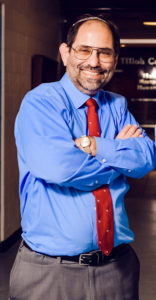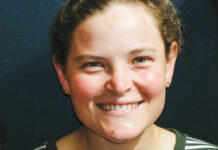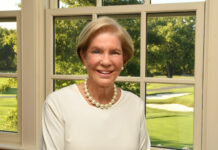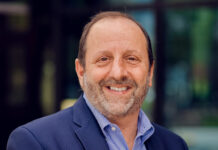
From sit-downs with the son-in-law of Louis Farrakhan to providing wall-to-wall coverage on the death of Yitzhak Rabin, Neil Rubin saw and reported on a great deal during his previous tenure as senior editor of the Baltimore Jewish Times.
Today, as the chair of the department of Jewish history at Beth Tfiloh High School, Rubin passes on his wisdom and expertise to the next generation of Jewish leaders.
Rubin, 58, lives in Pikesville with his wife, Ronit. They have two children, Leah, 23, and Ari, 21. Rubin is a member of both Chizuk Amuno Congregation and Chevrei Tzedek Congregation, he said, though he does his daily davening at Beth Tfiloh Congregation.
Growing up in Randallstown, Rubin and his family were regulars of Beth Israel Congregation, where Rubin attended Hebrew school three days a week. Rubin’s grandparents were some of the founders of the Rogers Avenue Synagogue, which merged with another congregation that in turn merged with Beth Tfiloh.
Rubin grew up knowing he wanted to be either a writer or a journalist. Many of the books he was most interested in reading at the time were written either by journalists or former journalists, telling stories about far-off locations.
Rubin received his bachelor’s degree in journalism from the University of Maryland, College Park, and his master’s in Jewish history from Baltimore Hebrew University. He received his doctorate in Jewish history from Towson University after it had merged with BHU, where he had done most of his studies for the degree.
Rubin worked for a time at B’nai B’rith International, then at The Associated: Jewish Federation of Baltimore. Later, while working as a freelance writer, he was hired by the Baltimore Jewish Times as the assistant editor of the Atlanta Jewish Times, which was then owned by the JT. He was later promoted to editor. He worked at the Atlanta publication from 1991 to 1998, then served as the senior editor at the Baltimore Jewish Times from 1998 to 2012.
Rubin’s work for the JT took him everywhere, from Israel to Canada, Taiwan, Russia, Ukraine and many locations within the United States, he said.
“There’s no such thing as a typical day in journalism,” Rubin said. “You could be working on something at 9:15 on September 11, 2001, and your Washington correspondent calls you and says, ‘Neil, turn on the TV real quickly, a plane just hit the World Trade Center and they think it’s terror.’
“Or you could have your phone ringing off the hook on a Saturday afternoon when you’re sleeping for Shabbat, and you later find out that Yitzhak Rabin has been assassinated,” Rubin added. “You had a lot of demands on your time, you had to learn how to manage your schedule and you had to be prepared to adjust and adapt all the time, because everything was constantly changing.”
One of the more interesting experiences Rubin had involved interviewing Leonard Farrakhan Muhammad, the chief of staff and son-in-law of Louis Farrakhan. Rubin had been scheduled to meet with Farrakhan himself the next day, but that didn’t end up happening.
“In the middle of the interview, he looked up at me and he goes, ‘You know Mr. Rubin, we’re not afraid of you scribes,’” Rubin said of his interview with Muhammad. “Which I knew was a direct reference to the Pharisees from the biblical era, whom some Christians believe were responsible for the death of Jesus. So I just smiled and looked at him and said, ‘That’s great,’ and I just kept on going. I mean, I wasn’t going to give in to that intimidation.”
Other career highlights included Rubin’s interviews with former Rep. Newt Gingrich, the late Rep. John Lewis, the late Holocaust survivor and author Elie Wiesel, and the king and queen of Jordan, he said.
Both journalism and Jewish journalism started going through massive changes following the 2008 recession, Rubin said, and he realized it was time to move on. After a short time at the Jewish Telegraphic Agency, he followed the advice of friends who recommended he turn to education.
Rubin took a teacher’s course and taught for a year in an inner city high school. Then, a friend let him know about an opening at Beth Tfiloh. Now, as the chair of its high school’s department of Jewish history, Rubin teaches and administers the department. He particularly enjoys teaching American Jewish history to his ninth grade class.
“What I love about that is it gives me an opportunity to really deepen the sense of Americanness and Jewishness of the kids, which I think is another path toward maintaining a strong Jewish identity for them in the future,” Rubin said.







